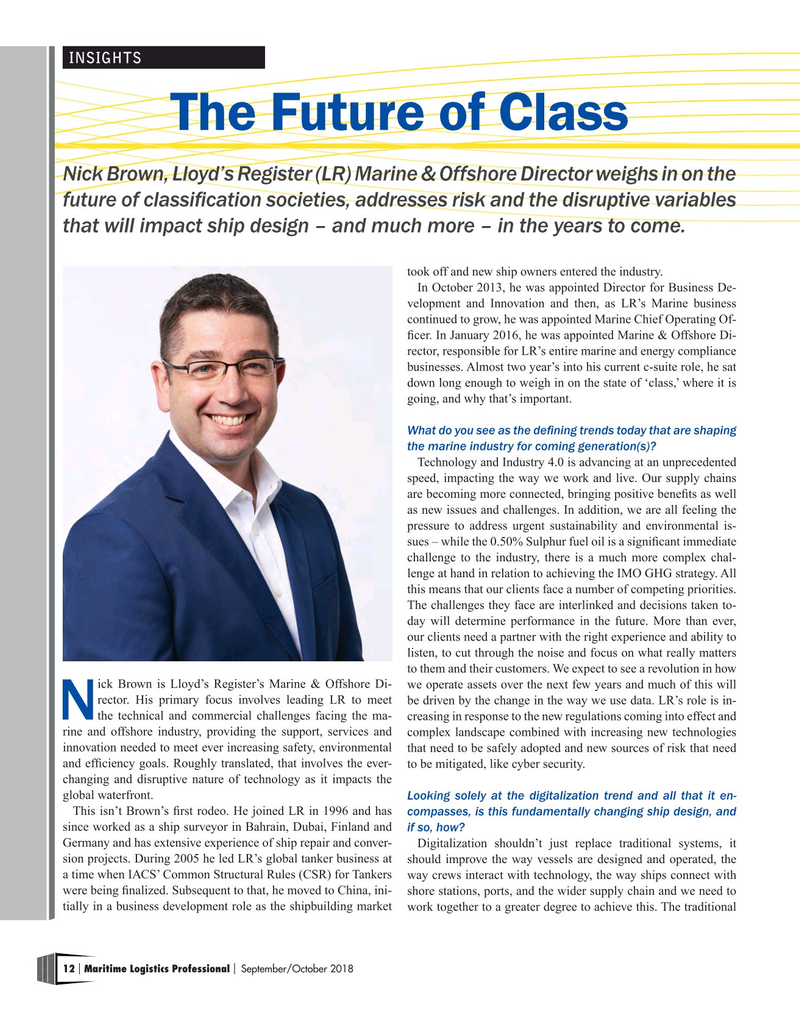
Page 12: of Maritime Logistics Professional Magazine (Sep/Oct 2018)
Liner Shipping & Logistics
Read this page in Pdf, Flash or Html5 edition of Sep/Oct 2018 Maritime Logistics Professional Magazine
INSIGHTS
The Future of Class
Nick Brown, Lloyd’s Register (LR) Marine & Offshore Director weighs in on the future of classifcation societies, addresses risk and the disruptive variables that will impact ship design – and much more – in the years to come. took off and new ship owners entered the industry.
In October 2013, he was appointed Director for Business De- velopment and Innovation and then, as LR’s Marine business continued to grow, he was appointed Marine Chief Operating Of- fcer. In January 2016, he was appointed Marine & Offshore Di- rector, responsible for LR’s entire marine and energy compliance businesses. Almost two year’s into his current c-suite role, he sat down long enough to weigh in on the state of ‘class,’ where it is going, and why that’s important.
What do you see as the defning trends today that are shaping the marine industry for coming generation(s)?
Technology and Industry 4.0 is advancing at an unprecedented speed, impacting the way we work and live. Our supply chains are becoming more connected, bringing positive benefts as well as new issues and challenges. In addition, we are all feeling the pressure to address urgent sustainability and environmental is- sues – while the 0.50% Sulphur fuel oil is a signifcant immediate challenge to the industry, there is a much more complex chal- lenge at hand in relation to achieving the IMO GHG strategy. All this means that our clients face a number of competing priorities.
The challenges they face are interlinked and decisions taken to- day will determine performance in the future. More than ever, our clients need a partner with the right experience and ability to listen, to cut through the noise and focus on what really matters to them and their customers. We expect to see a revolution in how ick Brown is Lloyd’s Register’s Marine & Offshore Di- we operate assets over the next few years and much of this will rector. His primary focus involves leading LR to meet be driven by the change in the way we use data. LR’s role is in-
N the technical and commercial challenges facing the ma- creasing in response to the new regulations coming into effect and rine and offshore industry, providing the support, services and complex landscape combined with increasing new technologies innovation needed to meet ever increasing safety, environmental that need to be safely adopted and new sources of risk that need and effciency goals. Roughly translated, that involves the ever- to be mitigated, like cyber security. changing and disruptive nature of technology as it impacts the global waterfront. Looking solely at the digitalization trend and all that it en-
This isn’t Brown’s frst rodeo. He joined LR in 1996 and has compasses, is this fundamentally changing ship design, and since worked as a ship surveyor in Bahrain, Dubai, Finland and if so, how?
Germany and has extensive experience of ship repair and conver- Digitalization shouldn’t just replace traditional systems, it sion projects. During 2005 he led LR’s global tanker business at should improve the way vessels are designed and operated, the a time when IACS’ Common Structural Rules (CSR) for Tankers way crews interact with technology, the way ships connect with were being fnalized. Subsequent to that, he moved to China, ini- shore stations, ports, and the wider supply chain and we need to tially in a business development role as the shipbuilding market work together to a greater degree to achieve this. The traditional 12 Maritime Logistics Professional September/October 2018 | |

 11
11

 13
13
